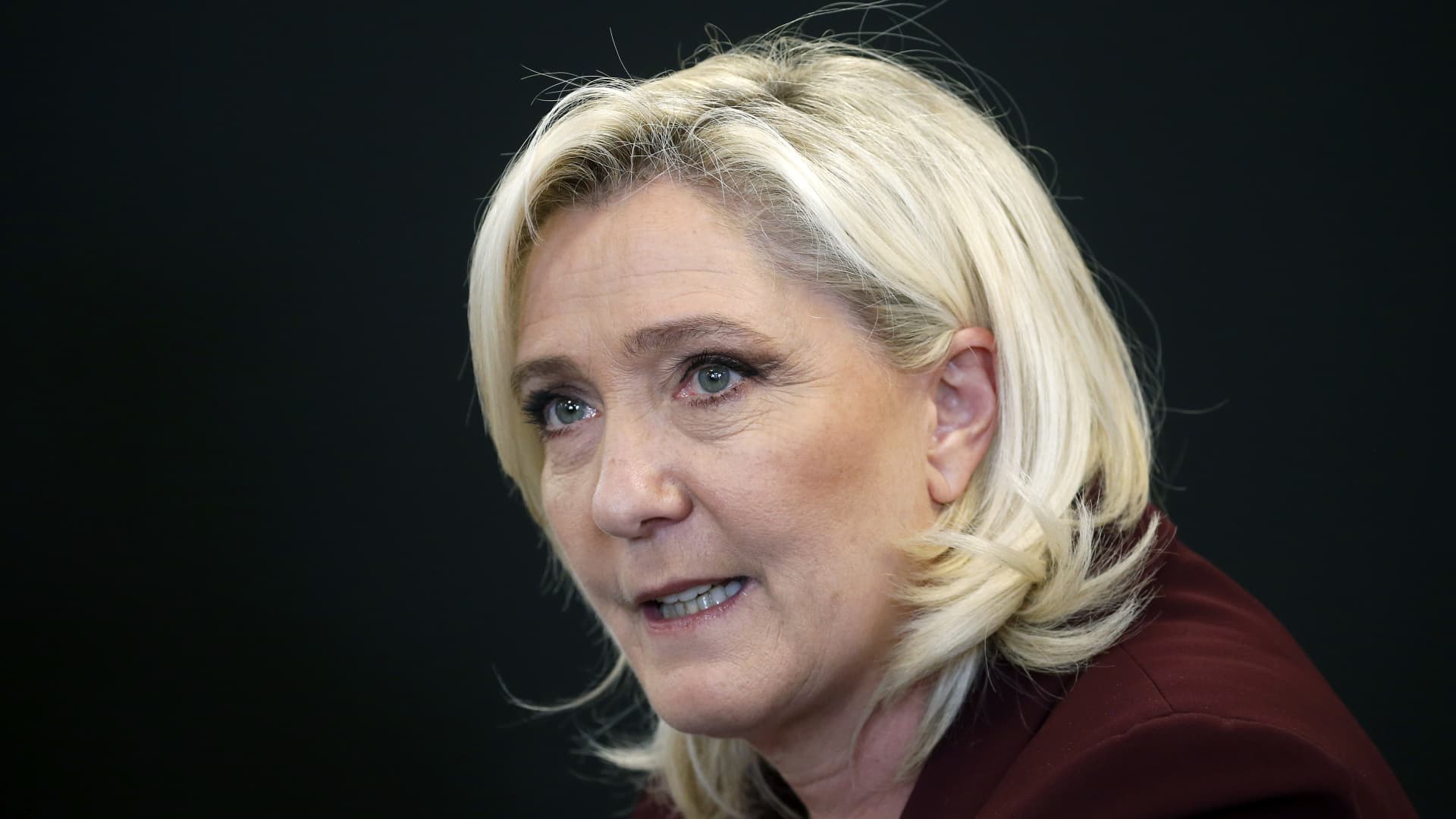
France’s far-right party Rassemblement National candidate for the 2022 French presidential election Marine Le Pen.
Chesnot | Getty Images News | Getty Images
The leader of France’s nationalist and far-right political party, Marine Le Pen, has seen her momentum stall in the runup to Sunday’s vote with her previous links to Russia resurfacing in recent days.
Le Pen obtained 23.1% of the votes in the first round of the French election on April 10 — coming second and earning her a place in the final runoff this Sunday against incumbent President Emmanuel Macron, who received 27.8% of the vote.
The Macron and Le Pen face-off is a repeat of the 2017 election, but this time around the early polling suggests that she has a better chance of defeating him.
But, in a key TV debate Wednesday against Macron, Le Pen was accused of being “dependent” on Russia and political commentators said that she failed to land any major blows on the French president. A poll out Thursday suggested that Macron will win the second round with 55% of the votes, with Le Pen on 45%.
During her election campaign, Le Pen’s team reportedly had to bin thousands of campaign leaflets that included a photo of her shaking hands with Russia’s leader Vladimir Putin. Her team said that a typographic error had been the cause of the scrapping, not the photo.
Macron told Le Pen during the two-hour debate Wednesday: “When you speak to Russia, you are speaking to your banker,” according to translation. Back in 2014, Le Pen’s party (National Front which has now rebranded as National Rally) reportedly requested loans from Russian banks including from the First Czech Russian Bank — a lender that is said to have links to the Kremlin. Le Pen rebuffed the accusations Wednesday, saying: “I am a completely free women.”
She added that her team is paying the loans every month and that she only borrowed from Russian banks because no French lender would lend money to her party.
Earlier this week, Russia’s opposition leader Alexei Navalny — in prison since returning to Russia last year after being treated for a poisoning attack — urged French voters to support Macron and alleged that Le Pen was too closely linked to Russia. Macron’s Finance Minister Bruno Le Maire also warned against Le Pen’s policies on Thursday, telling CNBC’s Charlotte Reed that France would look to withdraw from Europe if she came first on Sunday.
Mujtaba Rahman, managing director at consultancy firm Eurasia Group, told CNBC Friday that Le Pen had managed to evade scrutiny in the runup to the first round vote, “primarily because the campaign was so short and Zemmour [a far-right politician who also ran in the first round] made her look more moderate”
However, he said the level of media scrutiny going into the second round “has increased,” including over her ties to Russia.
Le Pen met Russian President Vladimir Putin face to face in 2017 ahead of that year’s presidential vote in France. She has also previously supported some of Russia’s foreign policies, including the decision to invade Ukraine’s Crimea in 2014 — arguing it was not illegal because the Crimean people had chosen to join Russia in a referendum. Western nations and the Ukrainian government deemed that vote in 2014 to be illegal.
Back in 2017, she also told the BBC that the policies she stood for were also represented by former U.S. President Donald Trump and by Putin.
Earlier this year, as Russia developed its military presence close to the border with Ukraine, Le Pen said she saw Moscow as an ally of France and that she did not believe that Russia wanted to invade Ukraine.
Since the Kremlin’s invasion, Le Pen has welcomed France’s support for Ukrainian refugees. But she has also criticized some of the sanctions imposed on Moscow, arguing that the measures are hurting French businesses and individuals.
Wednesday’s debate “will go down into history as a successful attempt at questioning Le Pen’s party democratic legitimacy,” Alberto Alemanno, professor or European law at H.E.C. Paris Business School, said via email, given Macron’s attack on Le Pen’s financial links to Putin’s Russia.
“This is set to capture the public imagination, by indissolubly associating a vote to Marine Le Pen to Putin’s Russia. To do so at the time of the Russian invasion of Ukraine appears one of the most powerful defenses to Macron’s presidency,” he added.






